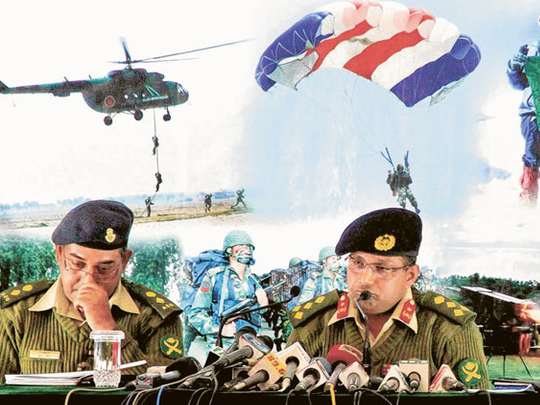
Dhaka: The Bangladesh army said on Thursday it foiled a coup attempt by retired and serving officers late last month which intelligence sources said was driven by a campaign to introduce Sharia law throughout the majority Muslim country and overthrow Prime Minister Shaikh Hasina's government.
Impoverished Bangladesh has a history of coups, with army generals running the South Asian nation for 15 years until the end of 1990.
"Specific information has been unearthed that some officers in military service have been involved in the conspiracy to topple the system of democratic governance," Brigadier General Mohammad Masoud Razzaq told reporters.
He said around 16 former and active officers were involved. Some had been detained and would appear before a military court.
Culprits to be punished
Sources in the army said the coup attempt was made late last month. "The attempt has been effectively controlled and now the process is on to punish the culprits," one military official said.
The Prime Minister's Office and the Home Ministry did not comment, but addressing a rally outside Dhaka earlier this week, Hasina urged Bangladeshis to remain alert.
"Some vested quarters are trying to cause unrest in the country and in the disciplined forces in a bid to destabilise the government and disrupt democracy," she said without naming one individual or group.
Political analysts said Hasina was pointing the finger at her rivals, especially the leaders of the Bangladesh Nationalist Party, who are demanding the government stands down.
Intelligence sources said the coup attempt was fuelled by a retired officer and associates in active service who were campaigning to introduce Sharia law.
An army-backed interim government, led by a former central bank governor, took power in January 2007 after a dispute between the two main parties over the makeup of the election commission. The government led a crackdown on corruption until an election in December 2008 brought Hasina to power.
Retired Major General Sayed Mohammad Ebrahim, a defence analyst, said the country and its democratic structures were reasonably immune to interference.
Worrying news
"Today's news about events in the army is worrying but will not cause any damage to democracy," he said.
Intelligence officials had repeatedly warned that militants with links to the military may try to oust Hasina.
"A band of fanatic officers had been trying to oust the politically established government. Their attempt has been foiled," Razzaq said.
Hasina took power in early 2009 and has since faced threats from radical groups.
A revolt in the country's paramilitary forces in February 2009 started in Dhaka and spread to a dozen other cities, killing more than 70 people, including 51 army officers.
The revolt was quelled after two days but the country has since been shadowed by fears of further uprisings.












